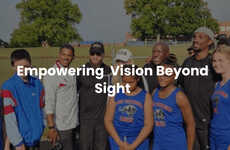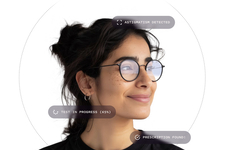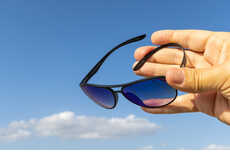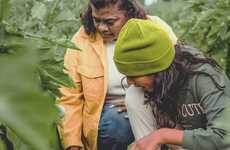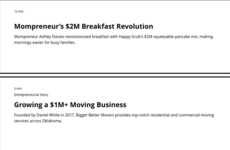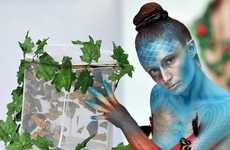
Tiana Reid — June 8, 2011 — Social Good
References: visionspring.org
SocialBusiness.org interviewed Dr. Jordan Kassalow, the Founder and CEO of VisionSpring in order to gain more insight into how his life-changing social enterprise came about and how he continues to make magic happen, despite the struggles and everyday realities that exist in the less-industrialized world.
In October, SocialBusiness.org profiled VisionSpring, an innovative social enterprise that provides eyeglasses and eye care to people in developing countries, including El Salvador, Bangladesh and South Africa. What is more, VisionSpring’s “Business in a Bag” initiative incorporates local entrepreneurs in the process, allowing for employment opportunities and self-fulfillment, while at the same time limiting dependency, a feat that is sometimes lost in charities.
Take a look at the SocialBusiness.org interview with VisionSpring’s Dr. Jordan Kassalow. The ability to see is often taken for granted, and Kassalow’s stories illuminate how healthy vision can change the quality of life for many.
Four Questions with Dr. Jordan Kassalow
1. How did the idea for the business model come about?
Since the mid-1980s, I have been dedicated to the advancement of vision care in the developing world. Previous experiences at both Helen Keller International and the Global Health Policy Program at the Council on Foreign Relations allowed for varied eye care involvement. Such experiences ranged from performing cataract surgery free of cost to low-income citizens in South India to preventative administering of Vitamin A for river blindness in West Africa. While the previously mentioned programs provide invaluable services for those in need, I came to realize that a larger majority of individuals benefitted from a simple pair of eyeglasses for vision correction. In addition, many of these same individuals were in search of sustainable employment. Therefore, I decided both needs could be met by training local entrepreneurs in low-income communities, to sell low-cost, high-quality eyeglasses to fellow neighbors. We began our efforts by training 20 women to sell reading glasses in South India. Today, we have expanded our model to 8 countries and during the process, expanded our product range to include prescription glasses.
2. How did you decide to join this sector?
While completing my first year of optometry studies, I decided to go on a service trip to Mexico with a student group, VOSH. Our team set up a small vision camp in a rural town where hundreds of locals lined up to get their eyes examined. One of the patients that day, a seven-year-old boy, had been convinced he was blind. Upon examination, I realized that he was simply near sighted and this issue, which had plagued him, could be solved with a mere pair of prescription glasses. The moment I placed these glasses on the boy, his face lit with joy and he gave me a tremendous hug. It was at this moment I realized I had the honor of being the boy’s first real image. From this moment forward, I decided eye care to the poor was to become my life’s work.
After spending numerous years providing eye care in the developing world, I soon realized that charity is a finite solution, not one that will sustain itself over time. The poor deserve a system which will eliminate dependency and begin making markets work on their behalf. For this reason, VisionSpring utilizes a social enterprise approach. Our social enterprise structure allows for four crucial opportunities not available through charity: sustainability, scale, empowerment and entrepreneurial opportunity. Today, our model offers change to all, the power to shape the destiny of themselves and their communities.
3. How do you get your inspiration?
Over the years, I have had the grand privilege of shaping relations with colleagues and by way of networks. The Henry Crown Fellowship at the Aspen Institute, The Council Foreign of Relations, The Skoll Foundation Fellowship, The Draper Richards Fellowship as well as the Ashoka Fellowship have provided indispensable inspiration for me.
Reading material on matters of social entrepreneurship and business remain eternal resources of inspiration and idea stimulation. I enjoy spending time in nature, absorbing the scenery while hiking in remote locations, this allows for true, free thinking.
4. How do you reset yourself to be creative? Do you have any rituals?
The best remedy is spending quality time with my children. It allows me to step out of the routine and into the spontaneous.
I make an effort to pause every Friday evening, to go to the temple and ponder issues that transcend the day-to-day struggles of life.
In October, SocialBusiness.org profiled VisionSpring, an innovative social enterprise that provides eyeglasses and eye care to people in developing countries, including El Salvador, Bangladesh and South Africa. What is more, VisionSpring’s “Business in a Bag” initiative incorporates local entrepreneurs in the process, allowing for employment opportunities and self-fulfillment, while at the same time limiting dependency, a feat that is sometimes lost in charities.
Take a look at the SocialBusiness.org interview with VisionSpring’s Dr. Jordan Kassalow. The ability to see is often taken for granted, and Kassalow’s stories illuminate how healthy vision can change the quality of life for many.
Four Questions with Dr. Jordan Kassalow
1. How did the idea for the business model come about?
Since the mid-1980s, I have been dedicated to the advancement of vision care in the developing world. Previous experiences at both Helen Keller International and the Global Health Policy Program at the Council on Foreign Relations allowed for varied eye care involvement. Such experiences ranged from performing cataract surgery free of cost to low-income citizens in South India to preventative administering of Vitamin A for river blindness in West Africa. While the previously mentioned programs provide invaluable services for those in need, I came to realize that a larger majority of individuals benefitted from a simple pair of eyeglasses for vision correction. In addition, many of these same individuals were in search of sustainable employment. Therefore, I decided both needs could be met by training local entrepreneurs in low-income communities, to sell low-cost, high-quality eyeglasses to fellow neighbors. We began our efforts by training 20 women to sell reading glasses in South India. Today, we have expanded our model to 8 countries and during the process, expanded our product range to include prescription glasses.
2. How did you decide to join this sector?
While completing my first year of optometry studies, I decided to go on a service trip to Mexico with a student group, VOSH. Our team set up a small vision camp in a rural town where hundreds of locals lined up to get their eyes examined. One of the patients that day, a seven-year-old boy, had been convinced he was blind. Upon examination, I realized that he was simply near sighted and this issue, which had plagued him, could be solved with a mere pair of prescription glasses. The moment I placed these glasses on the boy, his face lit with joy and he gave me a tremendous hug. It was at this moment I realized I had the honor of being the boy’s first real image. From this moment forward, I decided eye care to the poor was to become my life’s work.
After spending numerous years providing eye care in the developing world, I soon realized that charity is a finite solution, not one that will sustain itself over time. The poor deserve a system which will eliminate dependency and begin making markets work on their behalf. For this reason, VisionSpring utilizes a social enterprise approach. Our social enterprise structure allows for four crucial opportunities not available through charity: sustainability, scale, empowerment and entrepreneurial opportunity. Today, our model offers change to all, the power to shape the destiny of themselves and their communities.
3. How do you get your inspiration?
Over the years, I have had the grand privilege of shaping relations with colleagues and by way of networks. The Henry Crown Fellowship at the Aspen Institute, The Council Foreign of Relations, The Skoll Foundation Fellowship, The Draper Richards Fellowship as well as the Ashoka Fellowship have provided indispensable inspiration for me.
Reading material on matters of social entrepreneurship and business remain eternal resources of inspiration and idea stimulation. I enjoy spending time in nature, absorbing the scenery while hiking in remote locations, this allows for true, free thinking.
4. How do you reset yourself to be creative? Do you have any rituals?
The best remedy is spending quality time with my children. It allows me to step out of the routine and into the spontaneous.
I make an effort to pause every Friday evening, to go to the temple and ponder issues that transcend the day-to-day struggles of life.
Trend Themes
1. Eyeglasses and Eye Care in Developing Countries - Disruptive innovation opportunity: Develop low-cost, high-quality eyeglasses for vision correction and provide eye care services in developing countries, creating employment opportunities and improving quality of life.
2. Training Local Entrepreneurs for Vision Care - Disruptive innovation opportunity: Implement a social enterprise model that trains local entrepreneurs in low-income communities to sell eyeglasses and provide vision care services, promoting sustainability and empowerment.
3. Social Entrepreneurship and Business Inspiration - Disruptive innovation opportunity: Use social entrepreneurship as a model for sustainability and scale, taking inspiration from networks and organizations focused on social impact.
Industry Implications
1. Healthcare - Disruptive innovation opportunity: Introduce affordable eyeglasses and eye care services to underserved populations in developing countries, creating a new market and improving accessibility to vision care.
2. Retail - Disruptive innovation opportunity: Expand the market for low-cost eyeglasses by collaborating with local entrepreneurs in low-income communities, creating new retail channels and employment opportunities.
3. Education - Disruptive innovation opportunity: Incorporate vision care into education initiatives in developing countries, ensuring that students have access to eyeglasses and promoting academic success.
2.8
Score
Popularity
Activity
Freshness




